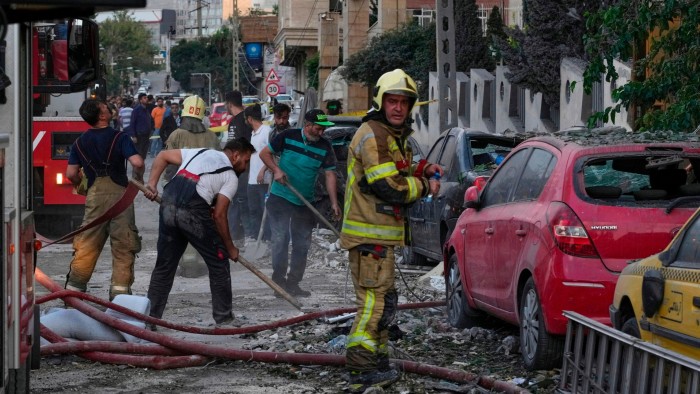Unlock the Editor’s Digest for free
Roula Khalaf, Editor of the FT, selects her favourite stories in this weekly newsletter.
Israel has launched dozens of air strikes against Iran targeting its nuclear programme, military facilities and killing its top two commanders in a devastating large-scale attack that pushed the Middle East into a new war.
Images on Iranian state television said the Natanz site in central Iran, one of the country’s two main nuclear plants, was struck around 4.15am and showed thick black smoke rising from the area.
After massive explosions rocked Tehran at about 3.30am local time on Friday, state television also showed smoke rising from the main command headquarters of the Revolutionary Guards, the regime’s most powerful military force, in eastern Tehran.
Iran’s state news agency said several senior military figures, including Major General Hossein Salami, head of the elite Revolutionary Guards, were killed, as well as Mohammad Mehdi Tehranchi, a prominent physics professor, and Fereydoon Abbasi, a former head of Iran’s atomic organisation.
Israeli Prime Minister Benjamin Netanyahu said Israel “struck at the heart of Iran’s nuclear enrichment programme”, saying it targeted Natanz, the republic’s “leading nuclear scientist” and its ballistic missile plants.
An Israeli military official said dozens of strikes were launched. Another official said the attacks could last for as long as two weeks.
Oil prices soared, topping 12 per cent and putting the commodity on course for one of its biggest one-day advances of the past decade. Brent crude, the international benchmark, rose 12.5 per cent at $78 a barrel during Friday trading in Asia. Futures tracking Wall Street’s blue-chip S&P 500 index fell 1.6 per cent.
The US said it was not involved in the attack, which came ahead of a sixth round of negotiations on Sunday between the Trump administration and Iran in an effort to resolve the nuclear crisis.
US President Donald Trump said on Thursday that Washington was “fairly close to a pretty good agreement”, adding that he did not want Israel to attack Iran because it could “blow” the chances of deal.
But Netanyahu, who had been lobbying the US to support military action against Iran, said in a video statement that Tehran was buying time, alluding to US and Israeli demands that Iran halt its nuclear enrichment programme.
“That is why we have no choice but to act and act now,” Netanyahu said.
Israel’s defence minister Israel Katz said Israel expected Iran to retaliate with “a missile and drone attack” as Israel closed its airspace and banned most non-essential gatherings.
Iran’s Supreme Leader Ayatollah Ali Khamenei said Israel “should expect a severe punishment”.
“The Zionist regime, through this crime, has created a bitter and painful fate for itself — one it will certainly face,” he said. “With God’s permission, the powerful hands of the Islamic republic’s armed forces will not leave it unpunished.”
Iranian officials also said they held the US responsible for the assault. Earlier this week Tehran reiterated warnings that the republic could also target American bases across the region if it was attacked.
US secretary of state Marco Rubio said in a statement Washington was “not involved in strikes against Iran and our top priority is protecting American forces in the region”.
“Israel advised us that they believe this action was necessary for its self-defence,” Rubio added. “Let me be clear: Iran should not target US interests or personnel.”
The strike follows a months-long stand-off over Iran’s nuclear programme, as Tehran has for several years been enriching uranium close to weapons grade.
Both Israel and the US have vowed to prevent the republic developing nuclear weapons. Tehran insists its programme is for peaceful civilian purposes, but it has the capacity to produce sufficient fissile material required for a nuclear weapon in less than two weeks.
Rafael Grossi, director-general of the International Atomic Energy Agency, said the UN nuclear watchdog was “closely monitoring the deeply concerning situation in Iran” after Natanz was struck.
He said the agency was in contact with Iranian authorities regarding radiation levels.
The UN atomic watchdog’s board on Thursday declared Iran was in breach of its non-proliferation obligations, the first such censure in two decades.
The strikes cap nearly two years of conflict across the Middle East that began with the war between Israel and Hamas triggered by the militant group’s October 7 2023 attack on Israel.
Additional reporting by Jamie Smyth and Steff Chávez in New York

